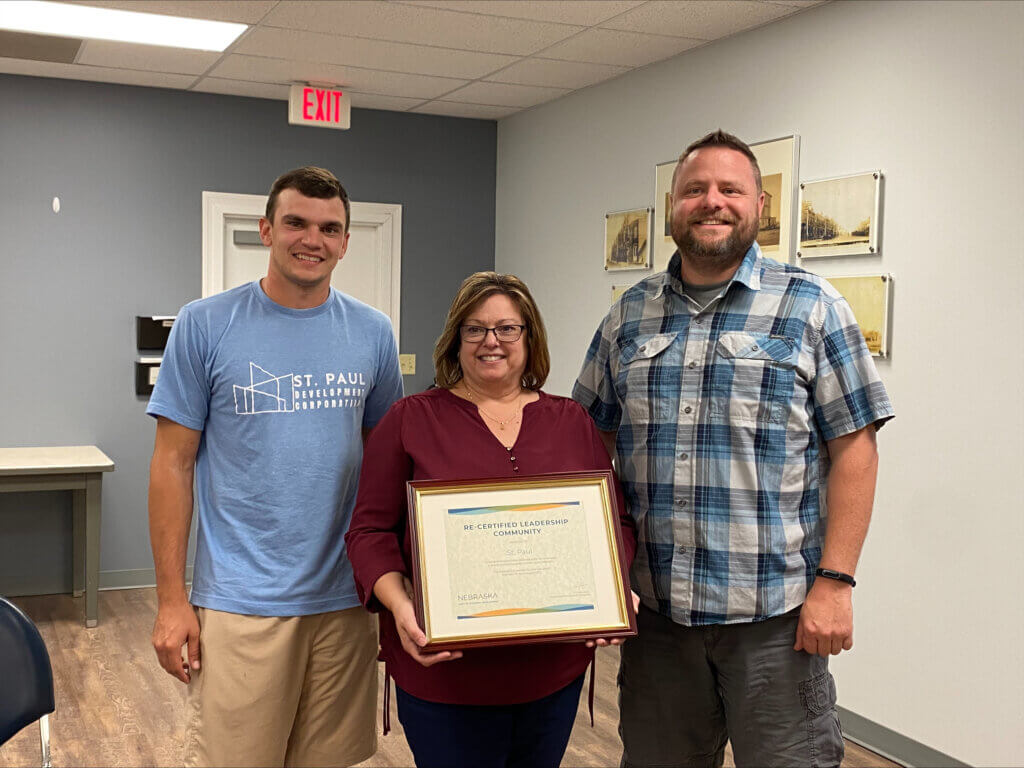
The Nebraska Department of Economic Development recognizes St. Paul as a member of the Leadership Certified Community program.
The City of St. Paul (pop. 2,290) has earned recognition in a statewide program that encourages economic readiness in rural communities. The Department of Economic Development (DED) recently announced St. Paul’s continued membership in Nebraska’s Leadership Certified Community (LCC) program. DED’s LCC Program Coordinator and Central Nebraska Business Development Consultant Kelly Gewecke honored local leaders during a special presentation on Tuesday, September 5th.
St. Paul is one of 31 Nebraska communities to qualify for the LCC program, which was created in 2011 to help municipalities adapt to ongoing changes and opportunities in economic development. Certified communities must demonstrate economic preparedness through strategic planning and evolving technology to help new and existing businesses grow. Qualifying LCC’s earn status in the program for five years and are required to maintain community websites to encourage development, which may include information on available sites and buildings and regional employment opportunities.
Local leaders have prioritized growth within St. Paul’s childcare, housing, and healthcare sectors. Howard County Medical Center began construction on a 17,000 square-foot therapy wellness center earlier this year, which will offer occupational, physical and speech therapy services. The $8 million project will include a walking track and swimming pool. In 2022, the city developed an Early Childhood Foundation to address childcare needs in Howard County.
Mayor Joel Bergman said multi-generational partnerships are helping community members determine St. Paul’s current and future developmental needs.
“Watching community members work toward consistent economic growth has been rewarding and exciting, and it has also contributed to our role as an LCC in Nebraska,” Mayor Bergman said. “We appreciate hearing perspectives from business owners and industry leaders who can often envision goals to develop St. Paul now and for years to come.”
The City recently was awarded $1 million in assistance from Nebraska’s Rural Workforce Housing Land Development Program, which helps communities acquire, improve, demolish, or secure vacant or abandoned properties to create workforce housing. The program was created in response to economic challenges created by COVID-19.
“St. Paul’s commitment to new housing construction has the potential to create opportunities for employers and their workforce, which are important assets in Howard County,” Gewecke said. “Nebraska’s LCCs are often trailblazers when it comes to utilizing new state programs, which can encourage other communities to set their own goals for development.”
City leaders have also prioritized essential infrastructure development, such as construction of a wastewater treatment facility, a new fire station and improvements to the community’s Middle Loup Subdivision. Electricity, sewer, and water projects, as well as new street construction, are being undertaken to encourage commercial and industrial development.
Bergman said strong local and regional partnerships are essential in creating economic momentum in the St. Paul community.
“It takes collaboration from multiple community partners to address public needs and implement ideas that will enable St. Paul to grow and prosper,” Bergman said. “We certainly can’t do it alone.”
For additional information about the Leadership Certified Community (LCC) Program, contact Kelly Gewecke at kelly.gewecke@nebraska.gov or 308-627-3151, or visit https://opportunity.nebraska.gov/programs/community/lcc/.
